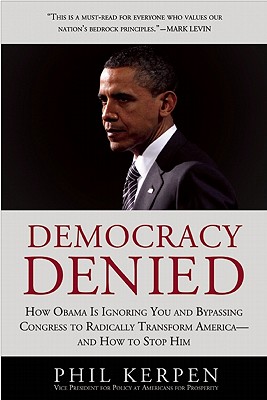'Democracy Denied' is the Guide to Fighting Over-Regulation

Phil Kerpen’s Democracy Denied ($24.95 in hardcopy; $9.99 for Kindle) Is a none-too-long book that, if widely read (which it deserves to be) would provide something that’s absent from today’s politics: a coherent and useful agenda for the Tea Party and its fellow travelers. Kerpen’s manifesto-like book, more than anything else, aims to focus the Tea Party on the excesses of government regulation.
And it’s a good place to direct the movement’s immense energy. Whether he’s talking about climate change policy or health care, Kerpen, a Vice President of Americans for Prosperity, makes the point that President Obama’s administration (like President Bush’s before him) has substituted burdensome regulations for democratic governance. More and more, the things that most impact the lives of ordinary Americans stem not from the actions of Congress but, rather, from federal regulations that impact everything from light-bulbs to credit cards.
There’s a place, even a significant one, for executive branch rulemaking but, time and again, efforts to stretch the powers of bureaucracies have placed huge burdens on the economy while delivering few, if any, public benefits. Indeed, every large agency of government has issued at least some regulations that do more harm than good. And Kerpen’s book outlines a workable, practical agenda for people of good will to fight against these big government excesses.
In his discussion of regulation, among other things, Kerpen makes a good case for the REINS Act which would subject economically significant regulations to Congressional up-or-down votes. (I’m still worried about that the REINS Act might undermine the Constitution's separation of powers but I’m a lot warmer towards it than once I was.)
This book isn’t going to turn me into a tea partier. I’d quarrel with Kerpen’s prescriptions in a few places and his characterizations of President Obama and his appointees as extremists even more. (Mostly, they’re garden-variety liberals--bad enough.) I still think that the conservative movement will achieve the most legislative and practical success if it can forward a positive agenda. But, although it doesn’t entirely speak for me, I do feel that Kerpen’s book is a valuable contribution: it offers the Tea Party an agenda that could do enormous good for the country. It’s well worth reading.

